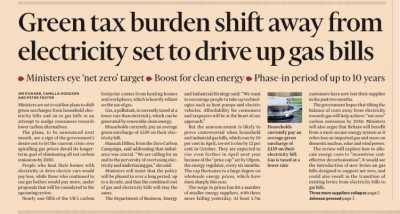Electricity and gas price hike
@jeff given it says the tariff is fixed until September, it might be worth a shot?
Octopus Go seems reasonable in my area, even the normal day rate. That might be worth a look depending where you live even for those without an EV.
Current rates inc VAT.
Unit rate (04:30 - 00:30):
15.96p/ kWh
Unit rate (00:30 - 04:30):
5.00p/ kWh
Standing Charge:
25.00p/ day
Prices include VAT.
I'd check some of these tariffs out if I was you guys - https://www.flexi-orb.com/ev-tariffs/
they are 100% up to date, but interesting to see EDF still does a 4.5p off peak tariff!
https://www.edfenergy.com/sites/default/files/goelectric_ratecard_aug23.pdf - EDF go electric is around 15/16p all day
Hi Kev,
I have been checking Octopus Agile prices over recent months, and they are now much higher. Today for example, the lowest 0.5 hour period is 17.54p and the highest periods 35p. Not exactly what they promised.
Octopus Go appears to be a much better option, unless they increase the price.
@derek-m I don't think they'll raise the go price for the moment. I doubt there are too many people on it so I doubt it's casing many issues with their bulky balance sheet
I don’t why it’s fine so blurry. It says there may be potential policy cost reductions on the cards for homes with electric heating and EVs. Would be good news.
Get a copy of The Ultimate Guide to Heat Pumps
Subscribe and follow our YouTube channel!
The problem is that there will be a huge outcry if gas prices rise. Lots of talk of fuel poverty, cold children, winters of discontent, etc.
From the FT article:
Ministers are set to outline plans to shift green surcharges from household electricity bills on to gas bills in an attempt to nudge consumers towards lower-carbon alternatives.
The plans — to be announced next month — are a sign of the government’s desire not to let the crisis over spiralling gas prices derail its longer-term goal of eliminating all net carbon emissions by 2050.
Citizens who heat their homes with electricity or drive electric cars would pay less, while those who continued to use gas boilers would pay more, under proposals that will be considered in the upcoming review.
Almost a fifth of the UK’s carbon footprint comes from heating homes and workplaces, which is heavily reliant on the use of gas. Gas, a pollutant, is taxed at a lower rate than electricity, which can be generated by renewable clean energy. Households pay an average green surcharge of £159 on their electricity bills.
Hannah Dillon, from the Zero Carbon Campaign, said addressing that imbalance was crucial. “We are calling for an end to the perversity of overtaxing electricity and undertaxing gas.” Ministers will insist the policy will be phased in over a long period — up to a decade — and that the combined cost of gas and electricity bills will stay the same.
The Department for Business, Energy and Industrial Strategy said: “We want to encourage people to take up technologies such as heat pumps and electric vehicles. Affordability for consumers and taxpayers will be at the heart of our approach.” But the announcement is likely to prove controversial at a time when household and industrial gas bills — which rose 10 per cent in April — are set to surge 12 per cent in October. They are expected to climb even further in April next year due to the “price cap” set every six months by Ofgem, the energy regulator. The cap fluctuates to a large degree depending on wholesale energy prices, which have risen sharply this year.
Ministers hope tilting the balance of costs away from electricity towards gas will help nudge consumers to install electric heat pumps and buy electric cars, both of which are essential components of the government plan to achieve “net zero” carbon emissions by 2050. The government is set to ban the sale of new gas boilers by 2035. Josh Buckland, at Flint Global, the consultancy, and a former energy adviser at the business department, said the government needed to introduce the switch fast enough to kickstart its plan to achieve the mass uptake of heat pumps by the end of the decade. He added that a decision to start shifting levies away from electricity on to gas would send a major price signal to the market.
“If the government doesn’t achieve the switch over the course of the next five years or so, consumers won’t achieve big enough savings from switching from a gas boiler to an electric heat pump to convince them to make the upfront investment.” The plan, dubbed the “energy affordability and fairness review”, will explore how to allocate energy costs to “incentivise cost-effective decarbonisation”. It will be published within weeks as part of the government’s much-delayed strategy for decarbonising buildings called the Heat and Buildings Strategy. The plan would involve the introduction of new levies on gas bills designed to support net zero, such as a charge on gas bills to help fund the fledgling hydrogen industry.
It could also result in the transition of existing levies from electricity bills to gas bills, such as those used to subsidise low-carbon electricity. That could include: subsidies for renewable energy, including “contracts for difference”, which guarantee the price of energy; protecting energy producers from volatile wholesale prices; and “feed-in tariffs”, payments to households that produce their own renewable electricity, which are paid for through a levy on energy bills.
Ministers will also argue that Britain will benefit from a more secure energy system as the nation comes to rely less on imported gas and more on domestically generated nuclear, solar and wind power. Separately, the business department is expected to set out plans for the proceeds of the UK’s emissions trading system, a cap-and-trade scheme that requires polluters to buy allowances to cover their emissions.
The government said last year that “a long-term decarbonisation funding stream” would come from “a share of the UK ETS”. A Treasury review of where the costs of net zero will fall, also long delayed, is expected to be published before the November COP26 climate conference the UK is hosting in Glasgow. Dillon said the government had to ensure there were “financial cushions” available to support those least able to pay as the changes designed to achieve net zero came into effect. “There’s a really big job to do to sell to the public the benefits that will come from the transition.”
I think the current energy price rises will make any changes to the pricing regime, in the short run, politically very difficult for the government.
Whatever the absolute level of prices an incentive to switch from gas to electricity will only be effective if the price multiple of electricity over gas is within the achievable efficiency of heat pumps. As we all know the actual efficiency in use depends very much on getting the specification and installation right. Not all users will be able to achieve the optimum level needed to offset the installation cost and deliver running costs below that of gas.
There is huge potential here for mass installation of systems that don't deliver either on economic or environmental grounds.
Many of us here have also found that you have to be a much more involved consumer with a heat pump based system rather than a gas boiler. They are some way off being "plug and play" consumer products.
Mike
Grant Aerona HPID10 10kWh ASHP
@mike-patrick I think heat pumps do have the option of being cost effective for most. For example last september I used 1120kw of gas to heat my hot water (I am assuming basically no heating) this month I used 140kw for my ASHP. August was basically the same. Its the winter months that will be interesting, but I am already £750 in credit (£400 with my current supplier and I am owed £350 from the now bust Utility Point) from having zero bills over the summer. I feel like that's a pretty nice cushion.
Posted by: @batalto@mike-patrick I think heat pumps do have the option of being cost effective for most. For example last september I used 1120kw of gas to heat my hot water (I am assuming basically no heating) this month I used 140kw for my ASHP. August was basically the same. Its the winter months that will be interesting, but I am already £750 in credit (£400 with my current supplier and I am owed £350 from the now bust Utility Point) from having zero bills over the summer. I feel like that's a pretty nice cushion.
1120kw of gas in a month to heat your hot water. Sounds a lot, but maybe you have a relatively high usage of hot water?
- 27 Forums
- 2,495 Topics
- 57.8 K Posts
- 307 Online
- 6,220 Members
Join Us!
Worth Watching
Latest Posts
-

RE: Electricity price predictions
I am always impressed with how you keep abreast of so m...
By Batpred , 45 seconds ago
-

RE: Setback savings - fact or fiction?
I fully understand your reasoning, same steady inputs s...
By cathodeRay , 10 minutes ago
-
RE: Humidity, or lack thereof... is my heat pump making rooms drier?
@majordennisbloodnok I’m glad I posted this. There see...
By AndrewJ , 31 minutes ago
-
RE: What determines the SOC of a battery?
@batpred I didn't write the Seplos BMS software, I a...
By Bash , 2 hours ago
-
RE: Testing new controls/monitoring for Midea Clone ASHP
@tasos and @cathoderay thanks. I have some history grap...
By benson , 2 hours ago
-

I am having my existing heat pump changed to a Vaillant...
By trebor12345 , 3 hours ago
-
Our Experience installing a heat pump into a Grade 2 Listed stone house
First want to thank everybody who has contributed to th...
By Travellingwave , 3 hours ago
-

RE: Solis inverters S6-EH1P: pros and cons and battery options
Just to wrap this up here for future readers: The S...
By Batpred , 6 hours ago
-
RE: Struggling to get CoP above 3 with 6 kw Ecodan ASHP
Welcome to the forums.I assume that you're getting the ...
By Sheriff Fatman , 6 hours ago
-
RE: Say hello and introduce yourself
@editor @kev1964-irl This discussion might be best had ...
By GC61 , 8 hours ago
-

@painter26 — as @jamespa says, it's for filling and re-...
By cathodeRay , 11 hours ago
-

RE: Oversized 10.5kW Grant Aerona Heat Pump on Microbore Pipes and Undersized Rads
@uknick TBH if I were taking the floor up ...
By JamesPa , 22 hours ago
-

RE: Getting ready for export with a BESS
I would have not got it if it was that tight
By Batpred , 24 hours ago
-
RE: Need help maximising COP of 3.5kW Valiant Aerotherm heat pump
@judith thanks Judith. Confirmation appreciated. The ...
By DavidB , 1 day ago
-

RE: Recommended home battery inverters + regulatory matters - help requested
That makes sense. I thought better to comment in this t...
By Batpred , 1 day ago
-
Bosch CS5800i 7kW replacing Greenstar Junior 28i
My heat pump journey began a couple of years ago when I...
By Slartibartfast , 1 day ago
-

RE: How to control DHW with Honeywell EvoHome on Trianco ActiveAir 5 kW ASHP
The last photo is defrost for sure (or cooling, but pre...
By JamesPa , 1 day ago
-

RE: Plug and play solar. Thoughts?
Essentially, this just needed legislation. In Germany t...
By Batpred , 1 day ago
-
RE: A Smarter Smart Controller from Homely?
@toodles Intentional opening of any warranty “can of wo...
By Papahuhu , 1 day ago
-
RE: Safety update; RCBOs supplying inverters or storage batteries
Thanks @transparent Thankyou for your advic...
By Bash , 1 day ago
-
RE: Air source heat pump roll call – what heat pump brand and model do you have?
Forum Handle: Odd_LionManufacturer: SamsungModel: Samsu...
By Odd_Lion , 1 day ago
-
RE: Configuring third party dongle for Ecodan local control
Well, it was mentioned before in the early pos...
By F1p , 2 days ago
-

RE: DIY solar upgrade - Considering adding more panels
I know this is a bit old, but it made me wonder what co...
By Batpred , 2 days ago





